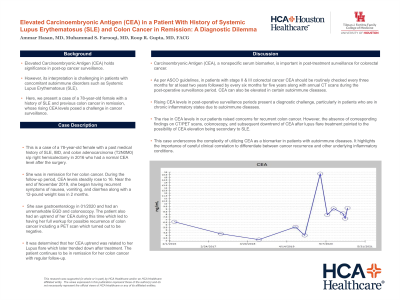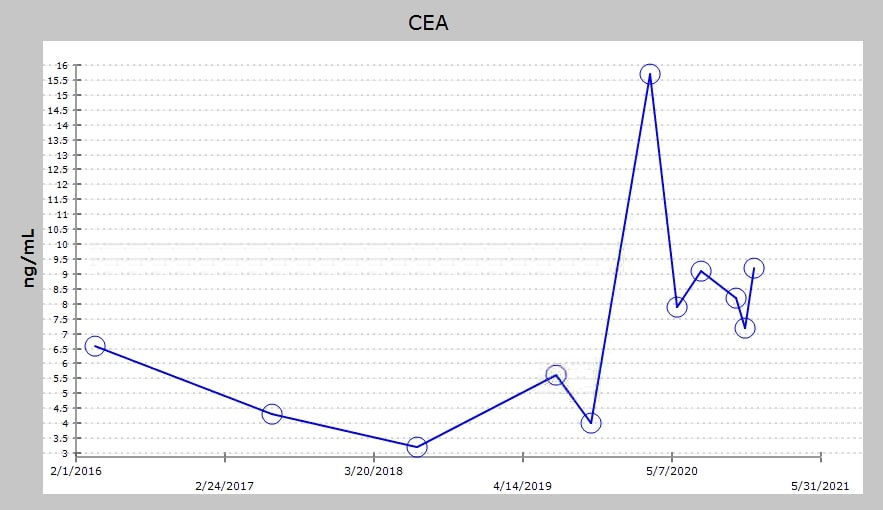Sunday Poster Session
Category: Colorectal Cancer Prevention
P0454 - Elevated Carcinoembryonic Antigen (CEA) in a Patient With History of Systemic Lupus Erythematosus (SLE) and Colon Cancer in Remission: A Diagnostic Dilemma
Sunday, October 27, 2024
3:30 PM - 7:00 PM ET
Location: Exhibit Hall E

Has Audio

Ammar Hasan, MD
HCA Kingwood
Kingwood, TX
Presenting Author(s)
Ammar Hasan, MD1, Muhammad S. Farooqi, MD2, Roop R. Gupta, MD, FACG2
1HCA Kingwood, Kingwood, TX; 2Insight Hospital and Medical Center, Chicago, IL
Introduction: Elevated Carcinoembryonic Antigen (CEA) holds significance in post-op cancer surveillance. However, its interpretation is challenging in patients with concomitant autoimmune disorders such as Systemic Lupus Erythematosus (SLE). Here, we present a case of a 78-year-old female with a history of SLE and previous colon cancer in remission, whose rising CEA levels posed a challenge in cancer surveillance.
Case Description/Methods: This is a case of a 78-year-old female with a past medical history of SLE, IBD, and colon adenocarcinoma (T2N0M0) s/p right hemicolectomy in 2016 who had a normal CEA level after the surgery. She was in remission for her colon cancer. During the follow-up period, CEA levels steadily rose to 16. Near the end of November 2019, she began having recurrent symptoms of nausea, vomiting, and diarrhea along with a 12-pound weight loss in 2 months. She saw gastroenterology in 01/2020 and had an unremarkable EGD and colonoscopy. The patient also had an uptrend of her CEA during this time which led to having her full workup for possible recurrence of colon cancer including a PET scan which turned out to be negative. It was determined that her CEA uptrend was related to her Lupus flare which later trended down after treatment. The patient continues to be in remission for her colon cancer with regular follow-up.
Discussion: Carcinoembryonic Antigen (CEA), a nonspecific serum biomarker, is important in post-treatment surveillance for colorectal cancer. As per ASCO guidelines, in patients with stage II & III colorectal cancer CEA should be routinely checked every three months for at least two years followed by every six months for five years along with annual CT scans during the post-operative surveillance period. CEA can also be elevated in certain autoimmune diseases. Rising CEA levels in post-operative surveillance periods present a diagnostic challenge, particularly in patients who are in chronic inflammatory states due to autoimmune diseases. The rise in CEA levels in our patients raised concerns for recurrent colon cancer. However, the absence of corresponding findings on CT/PET scans, colonoscopy, and subsequent downtrend of CEA after lupus flare treatment pointed to the possibility of CEA elevation being secondary to SLE. This case underscores the complexity of utilizing CEA as a biomarker in patients with autoimmune diseases. It highlights the importance of careful clinical correlation to differentiate between cancer recurrence and other underlying inflammatory conditions.

Disclosures:
Ammar Hasan, MD1, Muhammad S. Farooqi, MD2, Roop R. Gupta, MD, FACG2. P0454 - Elevated Carcinoembryonic Antigen (CEA) in a Patient With History of Systemic Lupus Erythematosus (SLE) and Colon Cancer in Remission: A Diagnostic Dilemma, ACG 2024 Annual Scientific Meeting Abstracts. Philadelphia, PA: American College of Gastroenterology.
1HCA Kingwood, Kingwood, TX; 2Insight Hospital and Medical Center, Chicago, IL
Introduction: Elevated Carcinoembryonic Antigen (CEA) holds significance in post-op cancer surveillance. However, its interpretation is challenging in patients with concomitant autoimmune disorders such as Systemic Lupus Erythematosus (SLE). Here, we present a case of a 78-year-old female with a history of SLE and previous colon cancer in remission, whose rising CEA levels posed a challenge in cancer surveillance.
Case Description/Methods: This is a case of a 78-year-old female with a past medical history of SLE, IBD, and colon adenocarcinoma (T2N0M0) s/p right hemicolectomy in 2016 who had a normal CEA level after the surgery. She was in remission for her colon cancer. During the follow-up period, CEA levels steadily rose to 16. Near the end of November 2019, she began having recurrent symptoms of nausea, vomiting, and diarrhea along with a 12-pound weight loss in 2 months. She saw gastroenterology in 01/2020 and had an unremarkable EGD and colonoscopy. The patient also had an uptrend of her CEA during this time which led to having her full workup for possible recurrence of colon cancer including a PET scan which turned out to be negative. It was determined that her CEA uptrend was related to her Lupus flare which later trended down after treatment. The patient continues to be in remission for her colon cancer with regular follow-up.
Discussion: Carcinoembryonic Antigen (CEA), a nonspecific serum biomarker, is important in post-treatment surveillance for colorectal cancer. As per ASCO guidelines, in patients with stage II & III colorectal cancer CEA should be routinely checked every three months for at least two years followed by every six months for five years along with annual CT scans during the post-operative surveillance period. CEA can also be elevated in certain autoimmune diseases. Rising CEA levels in post-operative surveillance periods present a diagnostic challenge, particularly in patients who are in chronic inflammatory states due to autoimmune diseases. The rise in CEA levels in our patients raised concerns for recurrent colon cancer. However, the absence of corresponding findings on CT/PET scans, colonoscopy, and subsequent downtrend of CEA after lupus flare treatment pointed to the possibility of CEA elevation being secondary to SLE. This case underscores the complexity of utilizing CEA as a biomarker in patients with autoimmune diseases. It highlights the importance of careful clinical correlation to differentiate between cancer recurrence and other underlying inflammatory conditions.

Figure: The trend of CEA levels before surgery and during post-operative surveillance
Disclosures:
Ammar Hasan indicated no relevant financial relationships.
Muhammad Farooqi indicated no relevant financial relationships.
Roop Gupta indicated no relevant financial relationships.
Ammar Hasan, MD1, Muhammad S. Farooqi, MD2, Roop R. Gupta, MD, FACG2. P0454 - Elevated Carcinoembryonic Antigen (CEA) in a Patient With History of Systemic Lupus Erythematosus (SLE) and Colon Cancer in Remission: A Diagnostic Dilemma, ACG 2024 Annual Scientific Meeting Abstracts. Philadelphia, PA: American College of Gastroenterology.
